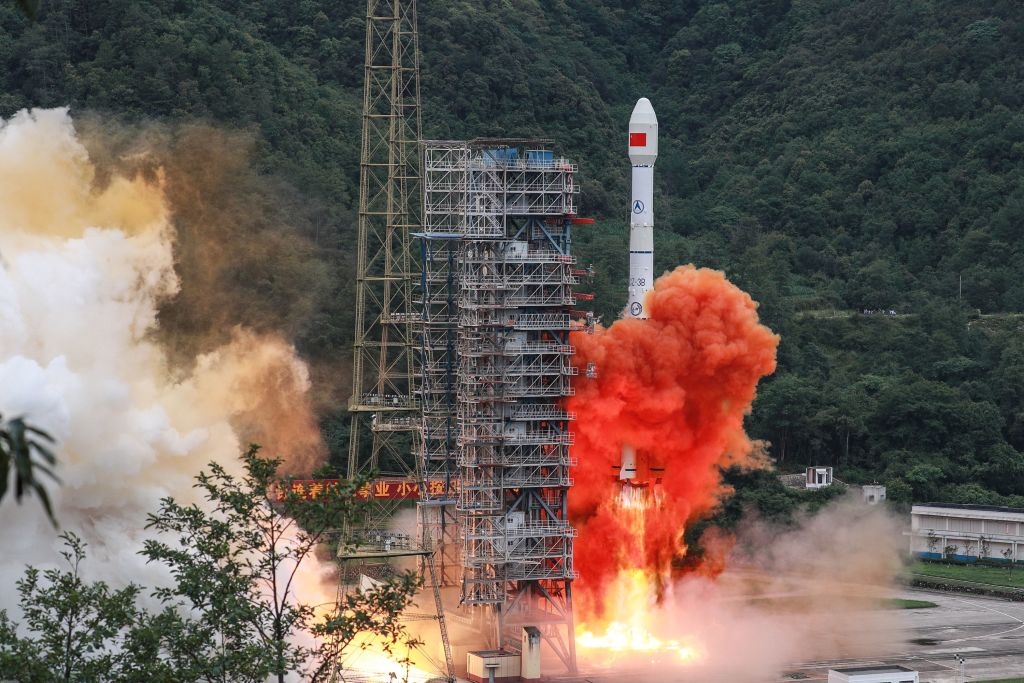In this mailing: - Judith Bergman: China and Russia's 'Space War': Where Is The US?
- Josef Zbořil: More Freedom of Speech in the West
by Judith Bergman • April 28, 2022 at 5:00 am "Evidence of both nations' intent to undercut the United States and allied leadership in the space domain can be seen in the growth of combined in-orbit assets of China and Russia, which grew approximately 70% in just two years." — Kevin Ryder, senior analyst at the U.S. Defense Intelligence Agency (DIA) for space and counterspace, Air Force Magazine April 12, 2022. Space has already become the scene of an ongoing "shadow war" in which China and Russia conduct attacks against U.S. satellites with lasers, radiofrequency jammers, and cyber-attacks every day, according to General David Thompson, the U.S. Space Force's first vice chief of space operations. "The threats are really growing and expanding every single day.... We're really at a point now where there's a whole host of ways that our space systems can be threatened.... Hostile action toward our space-based assets is not a question of 'if,' but instead, 'when.'" — General David Thompson, Washington Post, November 30, 2021. "Fifteen years after China's ASAT strike, we still lack the ability to defeat an attack on our space systems or launch an offensive strike if circumstances warrant." — US Air Force Gen. Kevin Chilton (Ret.), former commander of U.S. Strategic Command and Air Force Space Command, The Hill, April 12, 2022. "The PLA [People's Liberation Army] will continue to integrate space services... to erode the U.S. military's information advantage." — Annual Threat Assessment of the U.S. Intelligence Community, Office of the Director of National Intelligence, February 2022. "If deterrence were to fail, we would face an adversary that has integrated space into all aspects of their military operations.... Space provides the foundation of everything we do as a joint force, from delivering humanitarian assistance to combat on the ground, in the air, and at sea.... We cannot afford to lose space; without it we will fail." — General John W. Raymond, U.S. Chief of Space Operations, Space Force News, April 5, 2022.
 Space has already become the scene of an ongoing "shadow war" in which China and Russia conduct attacks against U.S. satellites with lasers, radiofrequency jammers, and cyber-attacks every day, according to General David Thompson, the U.S. Space Force's first vice chief of space operations. Pictured: A Long March 3B rocket, carrying the Beidou-3GEO3 satellite, lifts off from the Xichang Satellite Launch Center in China's Sichuan province on June 23, 2020. (Photo by STR/AFP via Getty Images) Space-based threats from China and Russia have grown exponentially in recent years, according to a new report on the issue by the U.S. Defense Intelligence Agency (DIA), published April 12. "Evidence of both nations' intent to undercut the United States and allied leadership in the space domain can be seen in the growth of combined in-orbit assets of China and Russia, which grew approximately 70% in just two years," noted Kevin Ryder, DIA senior analyst for space and counterspace. "This recent and continuing expansion follows a more than 200% increase between 2015 and 2018." "Space is a warfighting domain now," said Air Force Secretary Frank Kendall in April. "China's long-standing and extensive modernization program is the greatest challenge... Although China is the Department's pacing challenge, we also regard Russia as an acute threat."
Continue Reading Article by Josef Zbořil • April 28, 2022 at 4:00 am The possible redefinition of where this line [between censorship and disinformation] is drawn may be even more crucial for the future of the EU than economic issues. The question will be to what extent the [EU's] new code against disinformation fully preserves freedom of speech. "Public discussions of public issues, together with the spreading of information and opinion bearing on those issues, must have a freedom unabridged by our agents." — Statement of the US Presidential Medal of Freedom recipient Alexander Meiklejohn, "The First Amendment Is an Absolute", 1961. For a democratic system to work, it is necessary to have an electorate that is informed – with no constraints on the free flow of ideas or information. Democracy will not be trustworthy or sustainable if those in power are able to manipulate the electorate by withholding information and stifling criticism. "[T]he Internet, too, was hyped in its early days as a libertarian panacea that would free people from all centralized systems—but is now poised to make centralized authority more powerful than ever..." — Yuval Noah Harari, "Why Technology Favors Tyranny", October 2018. "The system is opaque, it has its own political agenda... One day, for example, Facebook will remind half of the people to go to the polls and tell the other less popular half to have a fry-up. In this case, it has the ability to significantly influence the election." — Daniel Vávra, game developer and entrepreneur, cnn.iprima.cz, September 17, 2020. The threat of censorship -- both at the national and European levels -- can be defined in three areas: a) The impact of "Big Tech" with its non-transparent algorithms in the digital environment; b) Decisions by politicians; c) Procedural actions by public officials. If totalitarian societies are restricted -- for instance, by enforcing censorship based on alleged blasphemy -- then democratic states need to be even more open -- as open as possible -- to provide an alternative to them, so people can hear a wide variety of viewpoints instead of monopolistic indoctrination. "The true Enlightenment thinker, the true rationalist, never wants to talk anyone into anything. No, he does not even want to convince; all the time he is aware that he may be wrong..." — Karl Popper, Austrian-British social philosopher, "On Freedom", August 25, 1958.
 For a democratic system to work, it is necessary to have an electorate that is informed – with no constraints on the free flow of ideas or information. Democracy will not be trustworthy or sustainable if those in power are able to manipulate the electorate by withholding information and stifling criticism. Democratic states need to be as open as possible, so people can hear a wide variety of viewpoints instead of monopolistic indoctrination. (Image source: iStock) "Free speech is essential to a functioning democracy. Do you believe Twitter rigorously adheres to this principle?" The entrepreneur Elon Musk asked in a Twitter poll on March 25, 2022. The answer was 70% no, 30% yes. On April 25, 2022, Musk struck a deal to buy Twitter for $44 billion, reportedly to build "arena for free speech". He has described himself as a free speech absolutist and has thankfully sparked a wider public discussion about free speech in a democracy. There are instances -- such as child-pornography, falsely "shouting fire in a crowded theater," or, to safeguard national security during a war (see Brandenburg v. Ohio for some of the legal reasoning) -- where there are and need to be constraints on free speech. Regarding false information, such as propaganda, Australian writer Caitlin Johnstone cautions against turning a free society into some kind of totalitarianism to fight an adversary: Continue Reading Article |
|
|
No comments:
Post a Comment